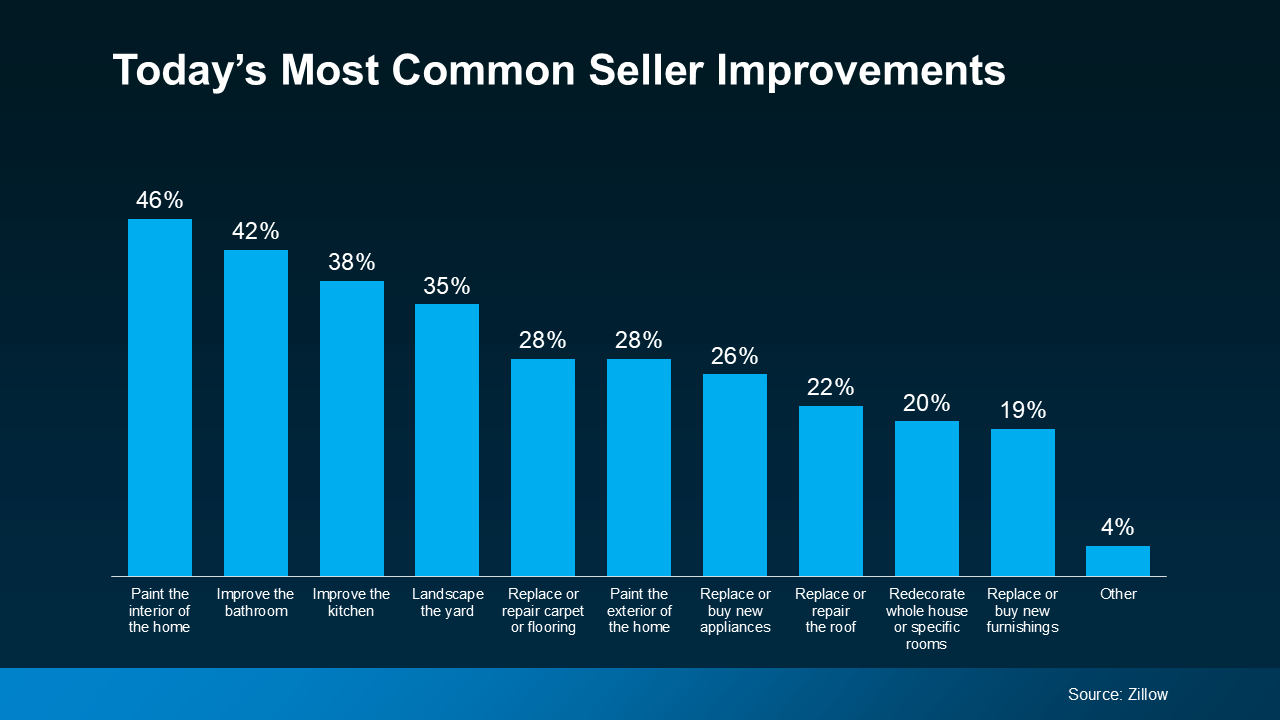Real Estate in an Election Year

With the 2024 Presidential election fast approaching, you might be wondering what impact, if any, it’s having on the housing market. Let’s break it down.
Election Years Bring a Temporary Slowdown
In any given year, home sales slow down slightly in the fall. It’s a typical, seasonal trend. However, according to data from BTIG, in election years there’s usually a slightly larger dip in home sales in the month leading up to Election Day.
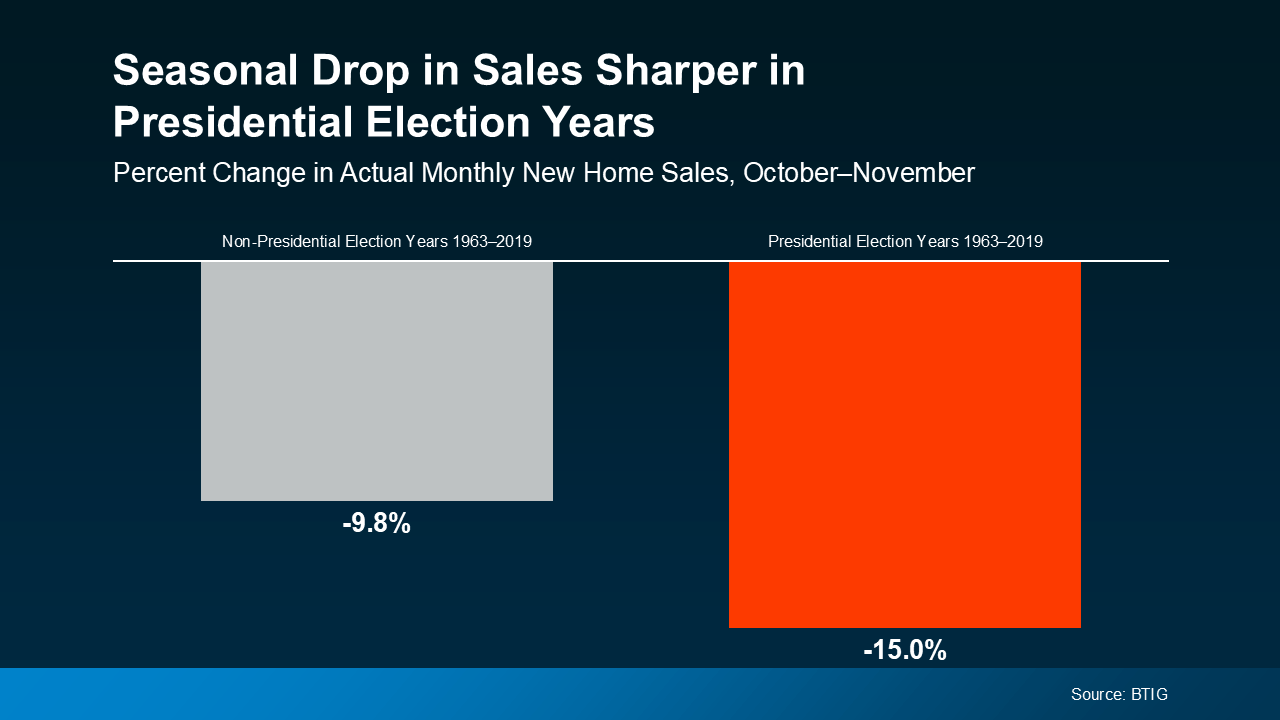
Home Sales Bounce Back After the Election
The good news is these delayed sales aren’t lost forever—they’re just postponed. History shows sales tend to rebound after the election is over. In fact, home sales have actually increased 82% of the time in the year after the election.
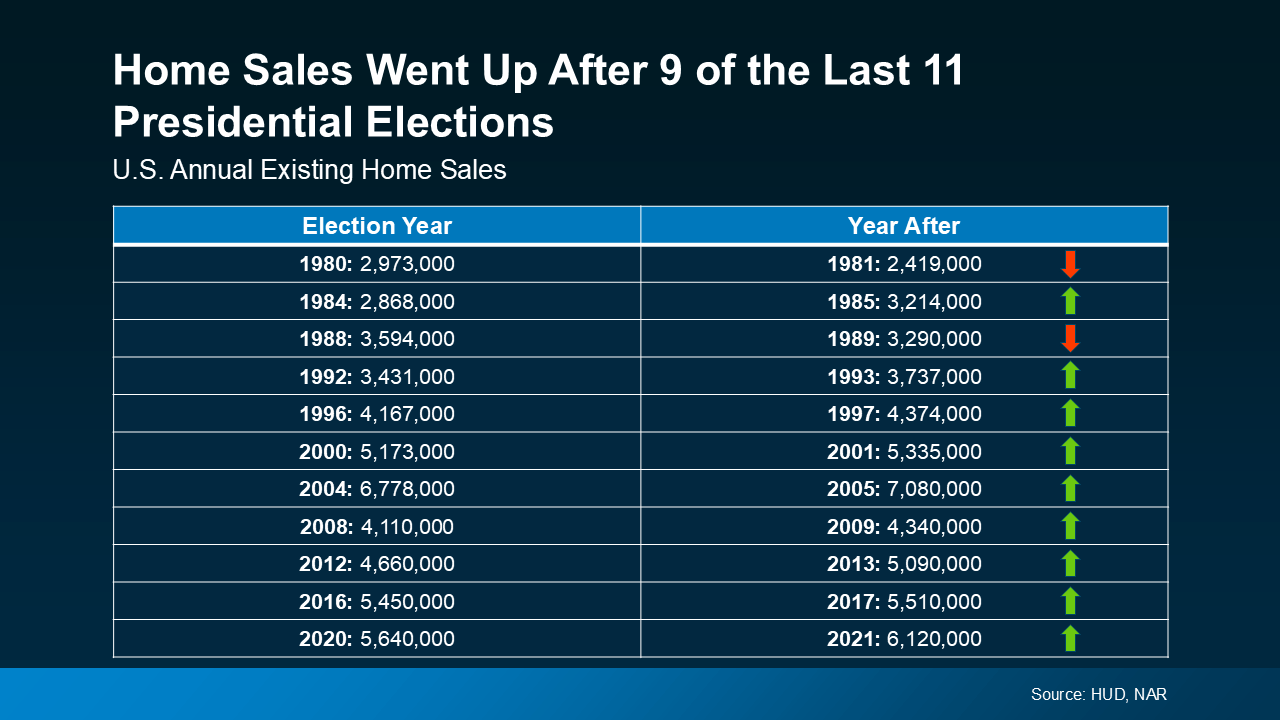
What To Expect in 2025
If history is any indicator, that means more homes will sell next year. And based on the latest forecasts, that’s exactly what you should expect. The housing market is on pace to sell a total of 4.6 million homes this year, and projections are for 5.2 million total sales next year. And that aligns with the typical pattern of post-election rebounds.
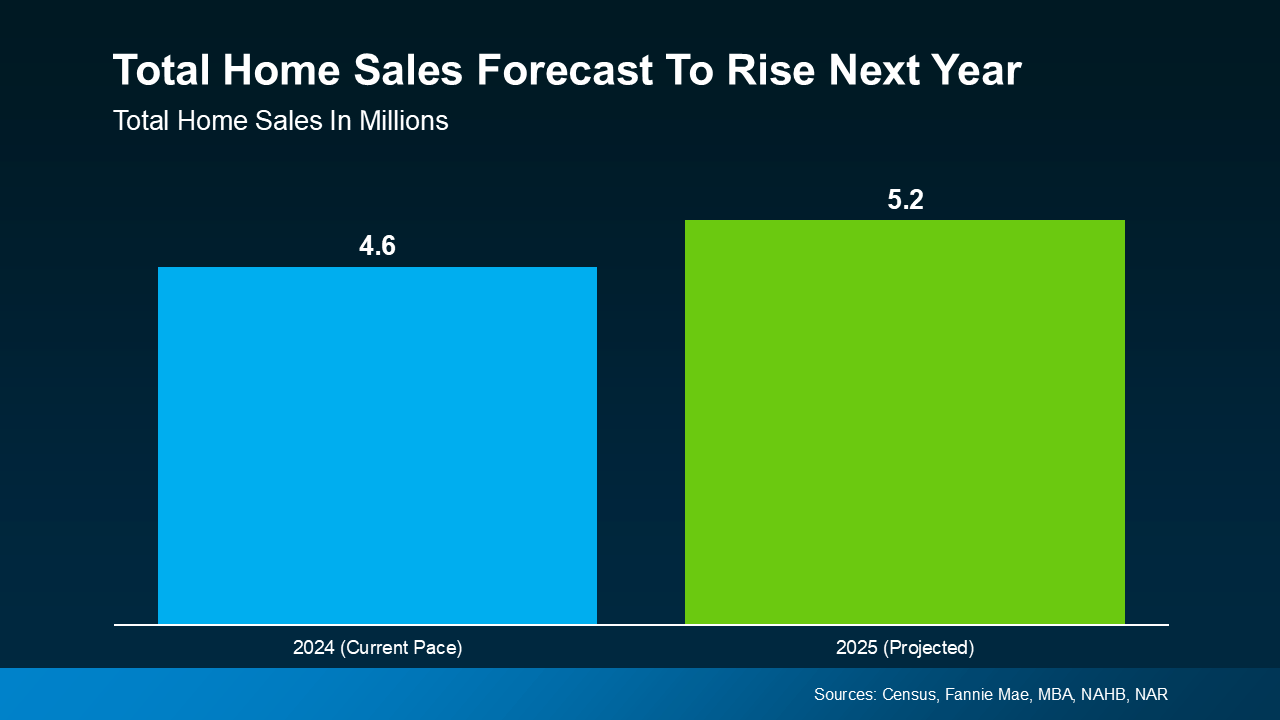
It’s important to remember that while election years often bring a short-term slowdown in the housing market, the pause is usually temporary. Those sales are not lost. Data shows home sales typically increase the year after a Presidential election, and current forecasts indicate 2025 will be no different. If you’re waiting for a clearer picture before making a move, just know that the market is expected to pick up speed in the months ahead.
Ready to Shine! New Listing Alert!

This home is sparkling and ready to shine.
Home maintenance and yard prep ✔️
Home professionally cleaned ✔️
Carpets professionally cleaned ✔️
Home staging complete ✔️
Photography & videography complete ✔️
Contractor box removed and keybox placed ✔️
Marketing flyers placed in home ✔️
Open house flyers delivered ✔️
Sign up ✔️
We’ve put in all the prep work, and now it’s time to share!


Planning To Sell Your House in 2025? Start Prepping Now…

If your goal is to sell your house in 2025, now’s the time to start prepping. Even though it might seem like there’s plenty of time between now and the new year, you should get a head start on any updates or repairs you want to make now. As Danielle Hale, Chief Economist at Realtor.com, says:
“ . . . now is the time to start thinking about what you need for your next home and then taking those steps to prepare to list . . . We have survey data that says 47 percent of sellers are taking longer than a month to get their home ready to sell, so getting them to start that process early can mean more flexibility.”
By starting your prep work early, you’ll give yourself plenty of time to get your house market-ready by the end of the year. But be sure to partner with your trusted local agent (me!) before you get started, so you have expert insight into what repairs are worth it based on your local market.
Why Starting Early Is Key
To get the best price and sell quickly, it’s important that your home looks its best. And that means it’s up to you to make the necessary repairs, declutter, and even consider updates that could add value as part of getting your house ready to list.
By starting now, you can tackle things one task at a time. Whether it’s fixing that leaky faucet, refreshing your landscaping, or painting a room, getting an early start gives you the flexibility to do the job right and with as little stress as possible. Because, if you wait to knock items off your list later on, they could quickly stack up and get overwhelming. As Realtor.com explains:
“There are some important repairs to make before selling a house, so don’t be in too much of a hurry to get your home listed … if you move too fast, buyers see right through the fact that you skipped important home renovations. And this . . . might end up costing you time and money.”
What Should You Focus On?
Feeling motivated to start chipping away at that to-do list, but not sure where to start? Here’s a look at the most common improvements other sellers are making today (see graph below):
And while that data gives you a starting point, it shouldn’t be seen as a comprehensive list. I help my clients focus on where to spending money on areas that will likely yield them a higher return based on our local data vs. focusing on those items that won’t offer as much return. This type of expert eye has been critical in helping my clients sell their home faster and for top dollar.
Thinking of selling your house next year? Don’t wait until the last minute to get it ready. By getting a head start now, you can ensure everything is in place by the time the new year rolls around.
Need advice on what to tackle first? Let’s connect.
Declutter or Keep?

When faced with a move, people often begin to re-evaluate their belongings. Should you declutter before you go? Perhaps this fresh start in a new home deserves a fresh start with new belongings too. Maybe the hassle of moving across the country with truckloads of items just doesn’t seem appealing or cost effective. It is likely your current belongings won’t fit in your new space anyways. Plus, if you are selling, a staged home tends to sell for more than it’s un-staged counterpart. Yes, you should declutter before you go.
If you have found yourself here, it is time to start decluttering and deciding which items you can part with and which you can’t live without. But how do you get rid of it all? Follow along below for key insights into making a successful yard sell and offer some of my favorite places to donate in Skagit and Snohomish Counties.
Host a Yard Sale
Hosting a yard sale is an excellent way to give a second life to your unwanted items, lighten your moving load, make room for new possessions, and potentially generate a little extra cash for the move. Here are some tips to ensure your yard sale is a success.
Separate Sell Items from Keep Items
Apart from keepsakes and heirlooms, a good rule of thumb is if you haven’t used something in over a year it is probably something you can live without and can contribute to the get rid of pile. Another approach is if an item no longer brings you joy or an inkling of excitement then it is likely past its life with you but could bring joy to someone else. Add it to the get rid of pile! Be sure to separate the items you are parting with from the items you are keeping. If you wish to be extra organize sort piles by price ranges. Try color coding your items with stickers to demonstrate your selling price.
Price Flexibility
Keep in mind that people like to negotiate the price. Determine now what items you are willing to negotiate on and which items you don’t feel there is room to budge. Price accordingly. Remember yard sales are not meant to get rich from, but instead helping to reduce your moving load and offer extended life to your unneeded items to keep them out of the waste plants.
Generate Neighborhood Excitement
Plan your yard sale in advance. It is likely you have friends and neighbors that have stuff they would like to part with too. Make it a neighborhood event so that multiple yard sales happen on the same day and same time. Together you can pitch in for signage that can be posted around town directing traffic to your neighborhood yard sale. This will attract more buyers and reduce your overhead costs. At the end of the sale, celebrate your success with a neighborhood gathering like a BBQ dinner or potluck.
Promote Your Neighborhood Yard Sale on Social Media
Boost the visibility of your yard sale by leveraging social media and neighborhood apps. Start by creating a Facebook event page and inviting all your friends. Share the event on Twitter with a fun hashtag and offer a prize for those who repost about your sale. Post a carousel of the items for sale on Instagram to attract more attention. Additionally, use Nextdoor or another neighborhood app to reach people beyond your immediate area. No matter what knick-knacks you uncover, expanding your audience will help ensure they find the right home. You might also wish to list your items on Facebook Marketplace or your local Buy Nothing groups. Check in your local area for local consignment shops that will sell your items for you and you receive a portion of the sale price in return.
Payment Options
Keep in mind that most people don’t carry cash anymore. It pays to have a variety of payment options so that negotiators can’t finagle your price due to lack of cash on hand. Try offering PayPal, Venmo, Zelle, or another form of digital payment. You will likely discover more sales and turn passer-buyers into buyers.
Donate your leftovers
The final step to declutter before you go is immediately after your sale, bag up the leftovers and take them to your local donation center. Otherwise, they will find their way right back into your house, garage, or storage and you will end up paying to transport them to your new home. Here is a list of several donation centers in Skagit and Snohomish Counties.
Arlington:
Skagit Valley:
North Cascades:
Anacortes:
Housing & Economic Update: Key Numbers to Know 10/7/2024

Windermere Principal Economist Jeff Tucker takes a look at the numbers in the Oct. 4 jobs report, how it impacted mortgage rates, and his prediction for rates in the coming months. Click HERE to watch his prediction.
This Is the Sweet Spot Homebuyers Have Been Waiting For

After months of sitting on the sidelines, many homebuyers who were priced out by high mortgage rates and affordability challenges finally have an opportunity to make their move. With rates trending down, today’s market is a sweet spot for buyers—and it’s one that may not last long.
So, if you’ve put your own move on the back burner, here’s why maybe you shouldn’t delay your plans any longer.
As you weigh your options and decide if you should buy now or wait, ask yourself this: What do you think everyone else is going to do?
The truth is, if mortgage rates continue to ease, as experts project, more buyers will jump back into the market. A survey from Bankrate shows over half of homeowners would be motivated to buy this year if rates drop below 6% (see graph below):
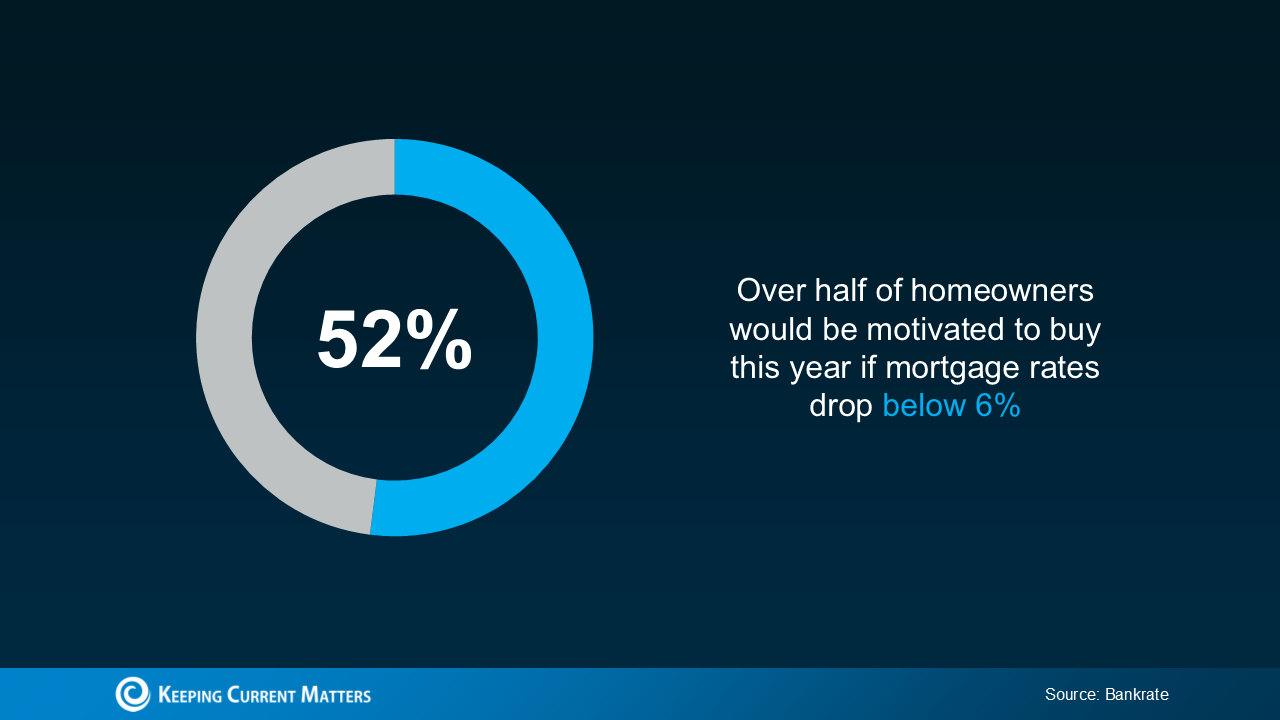
With rates already in the low 6% range, we’re not terribly far off from hitting that threshold. The bottom line is, that when they drop into the 5s, the number of buyers in the market is going to go up – and that means more competition for you.
That increased demand will likely push home prices up, which could potentially take away from some of the benefits you’d gain from a slightly lower interest rate. As Nadia Evangelou, Senior Economist and Director of Real Estate Research at the National Association of Realtors (NAR), explains:
“The downside of increased demand is that it puts upward pressure on home prices as multiple buyers compete for a limited number of homes. In markets with ongoing housing shortages, this price increase can offset some of the affordability gains from lower mortgage rates.”
So, while waiting to buy may seem like a smart move, it could backfire if rising prices outpace your savings from slightly lower rates.
What This Means for You
Right now, you’ve got the chance to get ahead of all of that. Today’s market is a buyer sweet spot. Why? Because a lot of other buyers are waiting – which means not as many people are actively looking for homes. That means less competition for you.
At the same time, affordability has already improved quite a bit. Recent easing in mortgage rates has made homeownership more accessible. As Mike Simonsen, Founder of Altos Research, says:
“Mortgage payments on the typical-price home are 7% lower than last year and are 13% lower than the peak in May 2024.”
And while the supply of homes for sale is still low, it’s also higher than it’s been in years. According to Ralph McLaughlin, Senior Economist at Realtor.com:
“The number of homes actively for sale continues to be elevated compared with last year, growing by 35.8%, a 10th straight month of growth, and now sits at the highest since May 2020.”
This means you now have more options to choose from than you’ve had in quite a while.
With fewer buyers in the market, improving affordability, and more homes to choose from, you have the chance to find the right one before the competition heats up.
Why Waiting Could Cost You
If you’re waiting for the perfect time to buy, it’s important to understand that timing the market is nearly impossible. The longer you wait, the higher the risk that market conditions will shift—and not necessarily in your favor. As Greg McBride, Chief Financial Analyst at Bankrate, says:
“It’s one of those things where you should be careful what you wish for. A further drop in mortgage rates could bring a surge of demand that makes it tougher to actually buy a house.”
Bottom Line
Don’t wait until you have to deal with more competition and higher prices – you already have the chance to buy a home while we’re in the sweet spot today.
How Long Does It Take to Close on a Home?

How Long Does It Take to Close on a Home?
The time it takes to close on a home can vary depending on several factors, including the specific circumstances of the home purchase and the parties involved. On average, it typically takes around 30 to 45 days to close on a home after the purchase agreement is signed. However, it’s important to note that this is just an estimate, and the actual timeline can be shorter or longer depending on various factors, such as:
- Mortgage Financing: If you’re obtaining a mortgage to purchase the home, the timeline can be influenced by factors such as the lender’s efficiency, the complexity of the loan application, and any potential delays in obtaining the necessary documentation or appraisal.
- Home Inspection and Appraisal: The time it takes to schedule and complete a home inspection and appraisal can impact the closing timeline. If any issues or discrepancies are found during these processes, it may require additional negotiations or repairs, which can extend the closing timeframe.
- Title Search and Insurance: A title search is typically conducted to ensure there are no outstanding liens or claims on the property. This process can take a few weeks, and obtaining title insurance may also be necessary, which can add additional time.
- Contingencies and Negotiations: The presence of contingencies in the purchase agreement, such as a home sale contingency or repairs requested by the buyer, can affect the closing timeline. If negotiations or resolutions are required, it may lengthen the closing process.
- Local Factors and Seasonal Variations: The time required to close on a home can vary depending on local customs, regulations, and the workload of the professionals involved, such as real estate agents, lenders, and attorneys. Additionally, certain seasons or times of the year, such as holidays or peak buying seasons, can result in increased demand and potentially longer closing times.
It’s essential to work closely with your real estate agent, lender, and other professionals involved in the process to get a more accurate estimate of the closing timeline for your specific situation.
When A Seller Wants to Buy Their Own Home

Getting a house ready for sale is a lot of work, however, always worth it in the end. For this listing, my client and I initially met up to discuss plans about four months prior to his home going live on the market. We came up with our list of “to do” items. We had a pre-inspection, organized and packaged up items not in use, painted, cleaned home professionally (including carpets), landscaping and interior staging. We were then ready for showtime with our photography day and then to go live!
After we had photos taken of this gorgeous home on the hill in Mount Vernon, my Seller told me that he loved it so that he’d want to buy his own home! If you love older homes that have been beautifully maintained, you don’t want to miss looking at this one. Click here to see why! 
Charming La Conner home with views of the Bay

Details: Discover a rare fee simple gem in LaConner with stunning bay views. This charming home features a main floor master suite for ultimate convenience, while the upper level offers two additional bedrooms, half bath and a versatile bonus room, ideal for guests. Inside, you’ll find beautiful hardwood floors and the cozy ambiance of a wood-burning stove. Enjoy a spacious updated kitchen with newer appliances and updated baths on both levels. The home opens up to two large new decks (hello summer), perfect for entertaining or enjoying peaceful moments surrounded by gorgeous landscaping as well as a detached studio perfect for guests, a home office, or a creative space. The property includes access to the use of Hope Island amenities.
View the virtual tour HERE. View the listing HERE.


 Facebook
Facebook
 X
X
 Pinterest
Pinterest
 Copy Link
Copy Link
